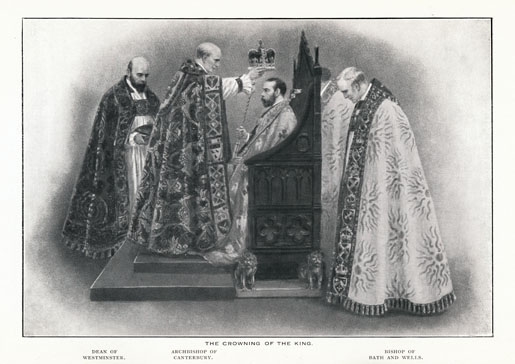
“I cannot understand it, after all I am only a very ordinary sort of fellow.“
King George V in response to the cheering crowds at his Silver Jubilee in 1935.
The 6th May 2010 marks the 100th anniversary of the ascension to the British throne of King George V. The image shows his coronation in 1911. It is taken from a souvenir booklet that was produced by Newcastle City Council for the King’s Silver Jubilee in 1935.
George was never meant to be King. However, his reign increased the popularity of the monarchy. The British people saw him as a down-to-earth man who sympathised with the hardships faced by the working classes. He was a sailor at heart – he spoke bluntly, talked loudly and enjoyed swearing! He was more common man than Royal and a liberal at heart. During the General Strike of 1926 the King disagreed with suggestions that the strikers were revolutionaries saying, ‘Try living on their wages before you judge them’. The British people felt that he was on their side and it was his very ordinariness that they loved.
George was born on 3rd June 1865. From the age of twelve he served in the Royal Navy. In 1891 his brother, Albert, died of pneumonia shortly after becoming became engaged to Princess Victoria Mary of Teck, who was known as May to her family. This left George second in line to the throne and ended his career in the Navy, as he took on more political duties. His grandmother, Queen Victoria, persuaded George to propose to May and they married in 1893.
Although George and May toured the British Empire, George preferred home life where he enjoyed hunting and collecting stamps. They lived in York Cottage at Sandringham, which was small enough so that George could avoid having to entertain! He preferred a quiet life and despised pomp and ceremony.
On 6th May 1910 his father, King Edward VII died, and George ascended to the throne. George’s reign bore witness to a period of upheaval and change, including the First World War, the formation of the first Labour government, strikes and the Depression. During the war, due to anti-German feelings in Britain, George changed the name of the Royal family from Saxe-Coburg and Gotha to Windsor.
George was disappointed in his heir Prince Edward’s failure to marry and his many love affairs. He prophetically said, ‘After I am dead, the boy will ruin himself within 12 months’. He was however, very fond of his son Albert and doted on his granddaughter, Princess Elizabeth whom he nicknamed Lilibet. He said, ‘I pray to God my eldest son will never marry and have children, and that nothing will come between Bertie and Lilibet and the throne’.
George died on 20th January 1936. A lifetime of heavy smoking had taken its toll. When he was near death his doctor, Lord Dawson, issued a statement announcing, ‘The King’s life is drawing peacefully to a close’. Dawson’s diary later revealed that he aided the King’s death by giving him a lethal injection of cocaine and morphine.
During the lying in state procession part of the Imperial State Crown fell from the coffin. Many saw this as an omen of the coming disastrous reign of Edward VIII, who abdicated before the end of the year, leaving his brother to ascend to the throne as George VI and eventually little Lilibet who became Queen Elizabeth II in 1952, just as George V had hoped.
